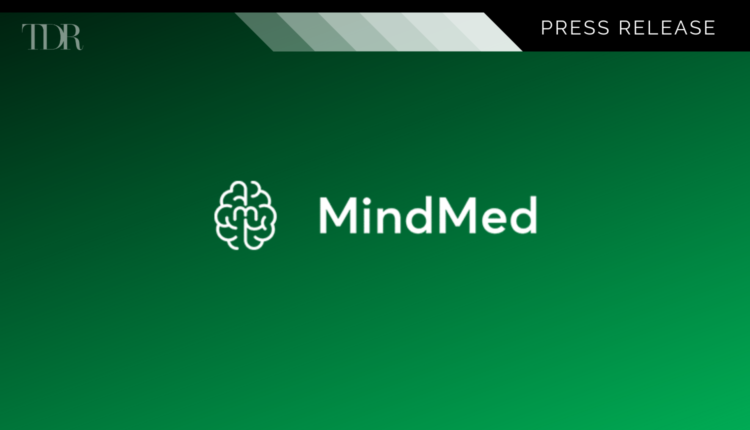
MindMed Announces the Publication of New Data on Personalized MDMA Dosing
MindMed (NEO: MMED) (OTCMKTS: MMEDF), a leading clinical-stage psychedelic medicine biotech company, announced the publication of the first study on MDMA dosing optimization using personalized medicine. The study took place at the University Hospital Basel Liechti Lab, in Basel, Switzerland. This study provides the first scientific data for predicting responses to MDMA and optimizing dosing. This may maximize the potential beneficial therapeutic effects while reducing adverse responses when treating medical conditions.
The study used data from 194 MDMA administrations in ten randomized placebo-controlled studies in healthy subjects conducted by the Liechti Lab at the University Hospital Basel, Switzerland.
Key findings of the study suggest:
- The dose of MDMA can be optimized using predictors known before dosing including body weight, sex, age, genetics, personality trait measures, and mood before drug administration.
- The dose of MDMA per kg body weight of the treated person best predicted the MDMA concentrations in the body and also mainly determined the acute subjective response to MDMA.
- Additionally, genetic testing of the drug metabolizing enzyme CYP2D6 is useful to adjust the dose of MDMA.
- Persons with low levels of CYP2D6 activity have higher MDMA plasma concentrations and may experience greater subjective MDMA effects and may benefit from a moderate dose reduction.
- Persons with a greater personality trait of “openness to a new experience” showed greater feelings of closeness and positive drug effects acutely induced by MDMA.
- In contrast, persons with personality traits of increased neuroticism or anxiety were both more likely to experience fear of ego dissolution and losing control. Similarly, more feelings of anxiety and depression in a person just before MDMA administration predicted more anxiety after MDMA administration.
- Women and men showed comparable MDMA effects if differences in body weight are considered in the dosing of MDMA.
- Previous minimal MDMA use, defined as previously using MDMA up to five times, did not influence the MDMA effect.
- In summary, personalizing MDMA dosing may help optimize the acute MDMA experience including more positive subjective effects of MDMA and reducing adverse effects of MDMA.
The study was published in the Journal of Psychopharmacology and the full-text can be accessed from the publishers at: https://journals.sagepub.com/doi/full/10.1177/0269881121998322
Dr. Matthias Liechti said, “To our knowledge, this is the first study on personalized MDMA treatment including pharmacogenetics, personality assessments, and psychometrics in one analysis. The method used allowed us to evaluate the relative importance of the different predictors. Very clearly, the dose of MDMA has the greatest impact on the acute subjective response. However, genetics, personality, and mood before MDMA use also moderated the response before MDMA use. Importantly, the data was obtained in studies using a safe hospital environment and in younger healthy volunteers with mostly no past MDMA experience. Additional data in patients is needed.”
With the promise of advances in psychedelic medicine we are aiming to step away from the rather rigid and inflexible drug centric approach of ‘one size fits all’ and start leveraging data and machine learning to help health professionals and patients engage new personalized therapies in the treatment paradigms. We are building unique biomarker profiles of individuals across genetics, phenotypes, personality traits, and cognitive states that will allow us to best predict which therapy framework configurations will be most effective. The analysis will also include set and setting related variables, therapy, post-therapy integration, and longitudinal follow-ups. Our work focuses on applying the concepts of personalized medicine, AI, and cross disciplinary cutting-edge research to better understand and predict how individual biological phenotypes, genetics, and mental states correlate and interact with responses to the new psychedelic intervention paradigms. We hope this will enable us to build and offer better decision support systems for healthcare professionals and their patients, delivering the best set of evidence and scientifically derived therapy framework options for mental health treatment.
MindMed Executive President, Dr. Miri Halperin Wernli
About MindMed
MindMed is a clinical-stage psychedelic medicine biotech company that discovers, develops and deploys psychedelic inspired medicines and therapies to address addiction and mental illness. The company is assembling a compelling drug development pipeline of innovative treatments based on psychedelic substances including Psilocybin, LSD, MDMA, DMT and an Ibogaine derivative, 18-MC. The MindMed executive team brings extensive biopharmaceutical experience to MindMed’s approach to developing the next generation of psychedelic inspired medicines and therapies.
MindMed trades on the Canadian exchange NEO under the symbol MMED. MindMed is also traded in the United States under the symbol MMEDF and in Germany under the symbol MMQ.
To view the original press release in its entirety click here

